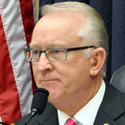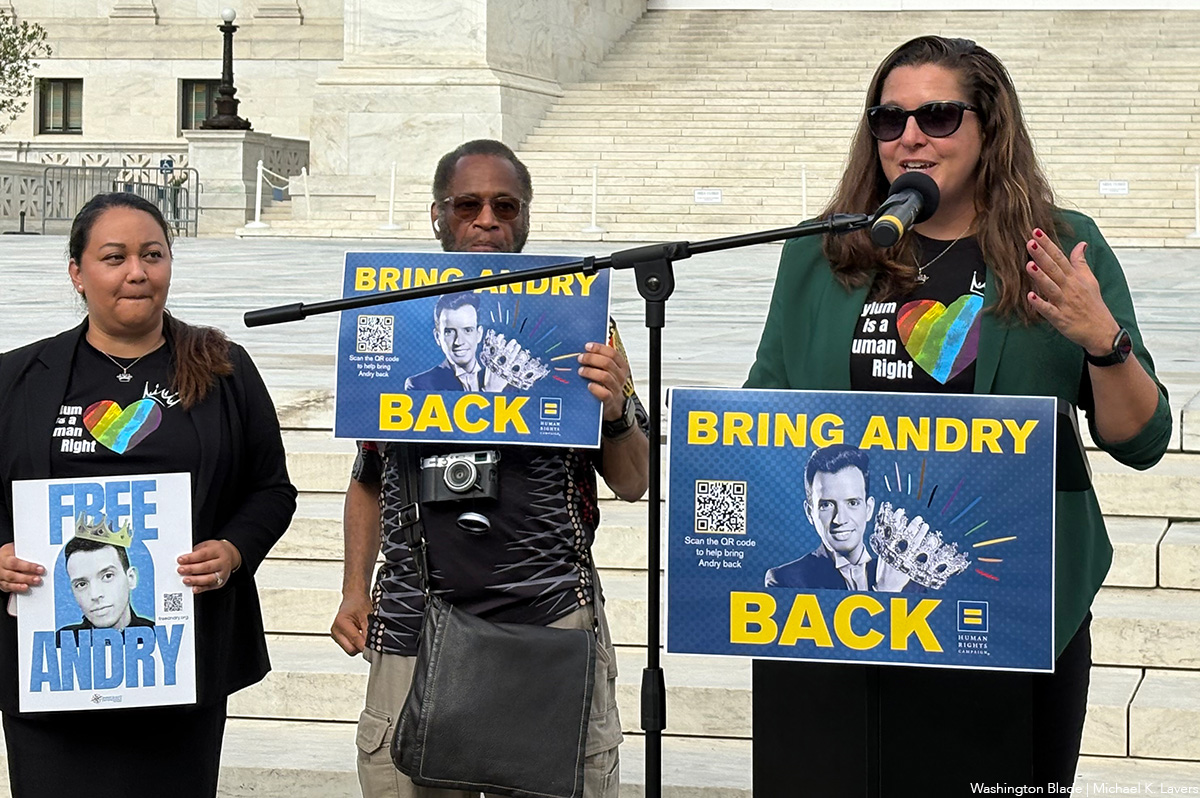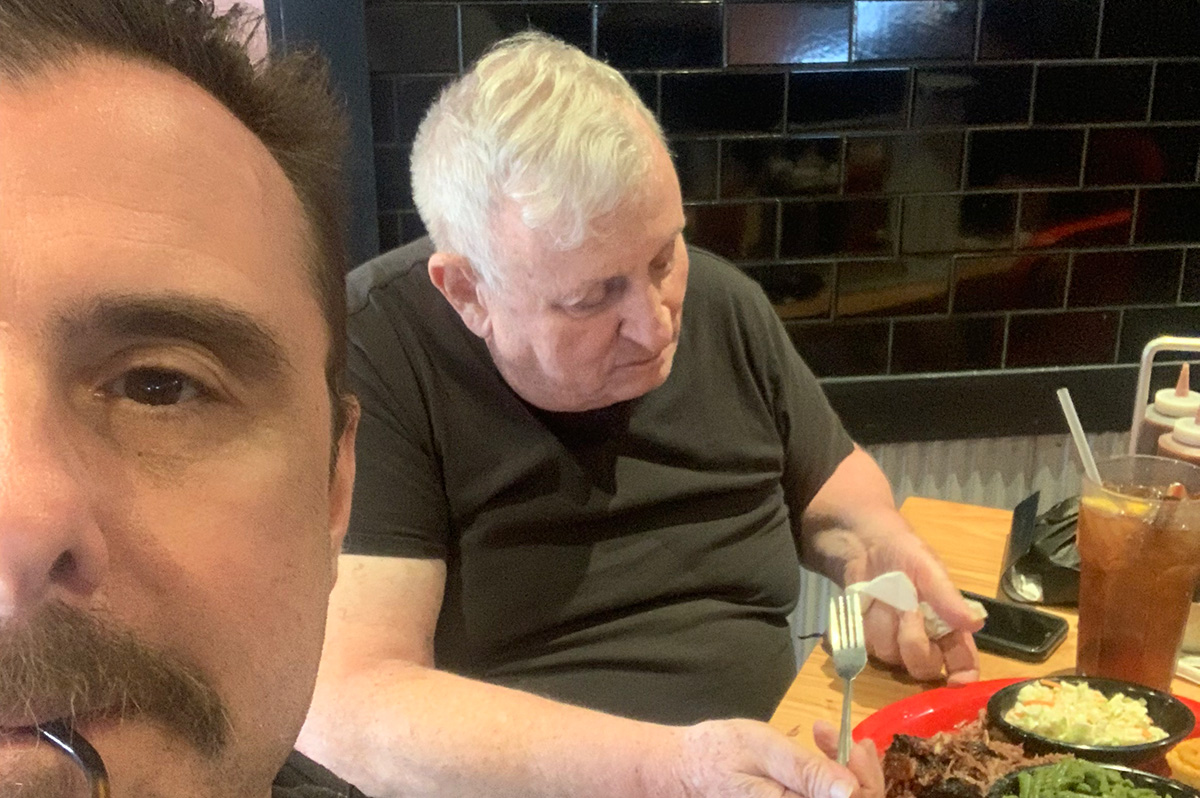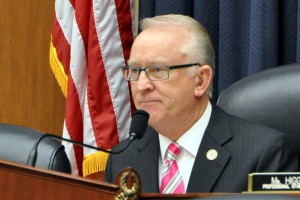National
House GOP seeks to delay end to ‘Don’t Ask’
Letter condemned as last-ditch effort to block open service

Senior Republicans on a House defense committee are seeking to delay the end of “Don’t Ask, Don’t Tell” on the basis that Congress hasn’t had an adequate opportunity to review the regulatory changes resulting from the end of the policy — a request the Pentagon has rebuffed.
House Armed Services Committee Chair Buck McKeon (R-Calif.) and House Armed Services Personnel Subcommittee Chair Joe Wilson (R-S.C.) write in a Sept. 12 letter to Defense Secretary Leon Panetta that an end to “Don’t Ask, Don’t Tell” — which is set for Tuesday — should be placed on hold because information on the new policy hasn’t been sufficiently available to Congress and the public.
Panetta — along with President Obama and Chairman of the Joint Chiefs of Staff Adm. Mike Mullen — certified the U.S. military was ready for open service on July 22, starting the 60-day period for when “Don’t Ask, Don’t Tell” will be removed from the books.
McKeon and Wilson contend they have requested, but not obtained, copies of the revised regulations that will take effect upon the end of the military’s gay ban.
“This failure to meet the committee’s requests leads us to conclude that decisions on the policies and regulations to implement repeal are not complete and that your certification and those of the others were inaccurate,” the Republicans write.
Additionally, McKeon and Wilson decry what they say is the lack of public availability of the new regulations resulting from the end of “Don’t Ask, Don’t Tell.” The Republicans contend this lack of availability harms service members, including gay and lesbian troops.
“We find it unconscionable that the policies and regulations that provide the guidelines and procedures to be used by service members and their leaders to implement repeal, as well as to protect the interests of all service members, including gay and lesbian members, remain unpublished,” the Republicans write.
Finally, McKeon and Wilson also say the time isn’t now for “Don’t Ask, Don’t Tell” repeal because certain regulatory changes needed for implementation will have to undergo a review and comment period before they can be effective and this period is not scheduled to begin until Tuesday.
“The need for review and comment before these regulations and policies can be effective directly contravenes the July 22 certifications,” the Republicans write. “The Department is not ready to implement the repeal because all the policies and regulations necessary for the transition are not yet final.”
Consequently, the Republicans urge Panetta to hold off on ending “Don’t Ask, Don’t Tell” until after Tuesday and these issues are addressed.
“We believe it is essential that you take immediate action to delay the implementation of repeal until such time that the review and comment period is completed, that DOD has incorporated the changes suggested during that comment period, and that the appropriate regulations needed to implement repeal have been distributed to and are understood by the leaders and key personnel in the field,” McKeon and Wilson write.
But the Defense Department is disputing these assertions and says an end to “Don’t Ask, Don’t Tell” will take place as planned on Tuesday.
“The repeal of Don’t Ask Don’t Tell will occur, in accordance with the law and after a rigorous certification process, on Sept. 20,” a Pentagon spokesperson said. “Senior Department of Defense officials have advised Congress of changes to regulations and policies associated with repeal. We take that obligation seriously.”
The spokesperson said top Defense Department officials, including the Pentagon’s general counsel, have already met with House Armed Services Committee staff and shared the proposed revisions to the regulations and new policies that will be issued.
Since legislation was signed in December to repeal “Don’t Ask, Don’t Tell,” more than 2 million troops have participated in training to prepare for open service and what is expected in a post-repeal environment.
A senior defense official, who spoke on condition of anonymity, said the military service secretaries, service chiefs, and combatant commanders submitted their recommendations months ago, and none suggested repeal be postponed.
LGBT advocates were quick to condemn the Republican letter as a last-ditch attempt to stall the inevitable end of “Don’t Ask, Don’t Tell.”
Aubrey Sarvis, executive director of the Servicemembers Legal Defense Network, said the GOP letter is “another example of the hardcore opposition attempting to delay or undo ‘Don’t Ask, Don’t Tell’ repeal.”
“I expect they will continue to look for openings to deny gay and lesbian service members the same rights and dignity as their straight counterparts,” Sarvis said.
Further, Sarvis said McKeon and Wilson are “simply wrong” in their assertion that new regulations haven’t been prepared within an appropriate manner.
“The statute only requires that the new regulations be prepared – not issued – before certification,” Sarvis said.
Joe Solmonese, president of the Human Rights Campaign, called the letter a “desperate move by extremist House members” to continue discrimination against gay service members.
“Wide majorities of Americans support allowing gay and lesbians to serve openly,” Solmonese said. “It is time to finally end this discriminatory law, and moves to stall will be seen by Americans for what they are – homophobic attempts to prevent the military from continuing down the path of full equality.”
NOTE: This article has been updated.
U.S. Federal Courts
Judge temporarily blocks executive orders targeting LGBTQ, HIV groups
Lambda Legal filed the lawsuit in federal court

A federal judge on Monday blocked the enforcement of three of President Donald Trump’s executive orders that would have threatened to defund nonprofit organizations providing health care and services for LGBTQ people and those living with HIV.
The preliminary injunction was awarded by Judge Jon Tigar of the U.S. District Court for the Northern District of California in a case, San Francisco AIDS Foundation v. Trump, filed by Lambda Legal and eight other organizations.
Implementation of the executive orders — two aimed at diversity, equity, and inclusion along with one targeting the transgender community — will be halted pending the outcome of the litigation challenging them.
“This is a critical win — not only for the nine organizations we represent, but for LGBTQ communities and people living with HIV across the country,” said Jose Abrigo, Lambda Legal’s HIV Project director and senior counsel on the case.
“The court blocked anti-equity and anti-LGBTQ executive orders that seek to erase transgender people from public life, dismantle DEI efforts, and silence nonprofits delivering life-saving services,” Abrigo said. “Today’s ruling acknowledges the immense harm these policies inflict on these organizations and the people they serve and stops Trump’s orders in their tracks.”
Tigar wrote, in his 52-page decision, “While the Executive requires some degree of freedom to implement its political agenda, it is still bound by the constitution.”
“And even in the context of federal subsidies, it cannot weaponize Congressionally appropriated funds to single out protected communities for disfavored treatment or suppress ideas that it does not like or has deemed dangerous,” he said.
Without the preliminary injunction, the judge wrote, “Plaintiffs face the imminent loss of federal funding critical to their ability to provide lifesaving healthcare and support services to marginalized LGBTQ populations,” a loss that “not only threatens the survival of critical programs but also forces plaintiffs to choose between their constitutional rights and their continued existence.”
The organizations in the lawsuit are located in California (San Francisco AIDS Foundation, Los Angeles LGBT Center, GLBT Historical Society, and San Francisco Community Health Center), Arizona (Prisma Community Care), New York (The NYC LGBT Community Center), Pennsylvania (Bradbury-Sullivan Community Center), Maryland (Baltimore Safe Haven), and Wisconsin (FORGE).
U.S. Supreme Court
Activists rally for Andry Hernández Romero in front of Supreme Court
Gay asylum seeker ‘forcibly deported’ to El Salvador, described as political prisoner

More than 200 people gathered in front of the U.S. Supreme Court on Friday and demanded the Trump-Vance administration return to the U.S. a gay Venezuelan asylum seeker who it “forcibly disappeared” to El Salvador.
Lindsay Toczylowski, president of the Immigrant Defenders Law Center, a Los Angeles-based organization that represents Andry Hernández Romero, is among those who spoke alongside U.S. Rep. Mark Takano (D-Calif.) and Human Rights Campaign Campaigns and Communications Vice President Jonathan Lovitz. Sarah Longwell of the Bulwark, Pod Save America’s Jon Lovett, and Tim Miller are among those who also participated in the rally.
“Andry is a son, a brother. He’s an actor, a makeup artist,” said Toczylowski. “He is a gay man who fled Venezuela because it was not safe for him to live there as his authentic self.”
(Video by Michael K. Lavers)
The White House on Feb. 20 designated Tren de Aragua, a Venezuelan gang, as an “international terrorist organization.”
President Donald Trump on March 15 invoked the Alien Enemies Act of 1798, which the Associated Press notes allows the U.S. to deport “noncitizens without any legal recourse.” The Trump-Vance administration subsequently “forcibly removed” Hernández and hundreds of other Venezuelans to El Salvador.
Toczylowski said she believes Hernández remains at El Salvador’s Terrorism Confinement Center, a maximum-security prison known by the Spanish acronym CECOT. Toczylowski also disputed claims that Hernández is a Tren de Aragua member.
“Andry fled persecution in Venezuela and came to the U.S. to seek protection. He has no criminal history. He is not a member of the Tren de Aragua gang. Yet because of his crown tattoos, we believe at this moment that he sits in a torture prison, a gulag, in El Salvador,” said Toczylowski. “I say we believe because we have not had any proof of life for him since the day he was put on a U.S. government-funded plane and forcibly disappeared to El Salvador.”
“Andry is not alone,” she added.
Takano noted the federal government sent his parents, grandparents, and other Japanese Americans to internment camps during World War II under the Alien Enemies Act. The gay California Democrat also described Hernández as “a political prisoner, denied basic rights under a law that should have stayed in the past.”
“He is not a case number,” said Takano. “He is a person.”
Hernández had been pursuing his asylum case while at the Otay Mesa Detention Center in San Diego.
A hearing had been scheduled to take place on May 30, but an immigration judge the day before dismissed his case. Immigrant Defenders Law Center has said it will appeal the decision to the Board of Immigration Appeals, which the Justice Department oversees.
“We will not stop fighting for Andry, and I know neither will you,” said Toczylowski.
Friday’s rally took place hours after Attorney General Pam Bondi said Kilmar Abrego Garcia, a Maryland man who the Trump-Vance administration wrongfully deported to El Salvador, had returned to the U.S. Abrego will face federal human trafficking charges in Tennessee.
National
A husband’s story: Michael Carroll reflects on life with Edmund White
Iconic author died this week; ‘no sunnier human in the world’

Unlike most gay men of my generation, I’ve only been to Fire Island twice. Even so, the memory of my first visit has never left me. The scenery was lovely, and the boys were sublime — but what stood out wasn’t the beach or the parties. It was a quiet afternoon spent sipping gin and tonics in a mid-century modern cottage tucked away from the sand and sun.
Despite Fire Island’s reputation for hedonism, our meeting was more accident than escapade. Michael Carroll — a Facebook friend I’d chatted with but never met — mentioned that he and his husband, Ed, would be there that weekend, too. We agreed to meet for a drink. On a whim, I checked his profile and froze. Ed was author Edmund White.
I packed a signed copy of Carroll’s “Little Reef” and a dog-eared hardback of “A Boy’s Own Story,” its spine nearly broken from rereads. I was excited to meet both men and talk about writing, even briefly.
Yesterday, I woke to the news that Ed had passed away. Ironically, my first thought was of Michael.
This week, tributes to Edmund White are everywhere — rightly celebrating his towering legacy as a novelist, essayist, and cultural icon. I’ve read all of his books, and I could never do justice to the scope of a career that defined and chronicled queer life for more than half a century. I’ll leave that to better-prepared journalists.
But in those many memorials, I’ve noticed something missing. When Michael Carroll is mentioned, it’s usually just a passing reference: “White’s partner of thirty years, twenty-five years his junior.” And yet, in the brief time I spent with this couple on Fire Island, it was clear to me that Michael was more than a footnote — he was Ed’s anchor, editor, companion, and champion. He was the one who knew his husband best.
They met in 1995 after Michael wrote Ed a fan letter to tell him he was coming to Paris. “He’d lost the great love of his life a year before,” Michael told me. “In one way, I filled a space. Understand, I worshiped this man and still do.”
When I asked whether there was a version of Ed only he knew, Michael answered without hesitation: “No sunnier human in the world, obvious to us and to people who’ve only just or never met him. No dark side. Psychology had helped erase that, I think, or buffed it smooth.”
Despite the age difference and divergent career arcs, their relationship was intellectually and emotionally symbiotic. “He made me want to be elegant and brainy; I didn’t quite reach that, so it led me to a slightly pastel minimalism,” Michael said. “He made me question my received ideas. He set me free to have sex with whoever I wanted. He vouchsafed my moods when they didn’t wobble off axis. Ultimately, I encouraged him to write more minimalistically, keep up the emotional complexity, and sleep with anyone he wanted to — partly because I wanted to do that too.”
Fully open, it was a committed relationship that defied conventional categories. Ed once described it as “probably like an 18th-century marriage in France.” Michael elaborated: “It means marriage with strong emotion — or at least a tolerance for one another — but no sex; sex with others. I think.”
That freedom, though, was always anchored in deep devotion and care — and a mutual understanding that went far beyond art, philosophy, or sex. “He believed in freedom and desire,” Michael said, “and the two’s relationship.”
When I asked what all the essays and articles hadn’t yet captured, Michael paused. “Maybe that his writing was tightly knotted, but that his true personality was vulnerable, and that he had the defense mechanisms of cheer and optimism to conceal that vulnerability. But it was in his eyes.”
The moment that captured who Ed was to him came at the end. “When he was dying, his second-to-last sentence (garbled then repeated) was, ‘Don’t forget to pay Merci,’ the cleaning lady coming the next day. We had had a rough day, and I was popping off like a coach or dad about getting angry at his weakness and pushing through it. He took it almost like a pack mule.”
Edmund White’s work shaped generations — it gave us language for desire, shame, wit, and liberation. But what lingers just as powerfully is the extraordinary life Ed lived with a man who saw him not only as a literary giant but as a real person: sunny, complex, vulnerable, generous.
In the end, Ed’s final words to his husband weren’t about his books or his legacy. They were about care, decency, and love. “You’re good,” he told Michael—a benediction, a farewell, maybe even a thank-you.
And now, as the world celebrates the prolific writer and cultural icon Edmund White, it feels just as important to remember the man and the person who knew him best. Not just the story but the characters who stayed to see it through to the end.
-

 World Pride 20252 days ago
World Pride 20252 days agoWorldPride recap: Festival, parade, fireworks, and Doechii
-

 U.S. Federal Courts2 days ago
U.S. Federal Courts2 days agoJudge temporarily blocks executive orders targeting LGBTQ, HIV groups
-

 Photos2 days ago
Photos2 days agoPHOTOS: WorldPride Parade
-

 Photos2 days ago
Photos2 days agoPHOTOS: WorldPride Street Festival and Closing Concert












